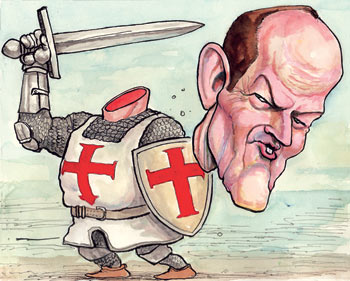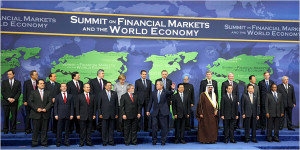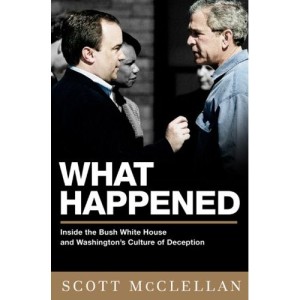When the U.S. economy sneezes, the rest of the world catches cold.
When the U.S. economy catches cold, the rest of the world faces an outbreak.
The credit crisis that started in the U.S. and traveled around the world had already made French, German and British economies suffer massive bailouts, forced the government of Iceland to seize its three largest banks, deepened economic deterioration in Hungary, Poland, Ukraine and questioned economic stability of emerging markets in China, Brazil, Russia and South Korea. Read more
The Global Financial Market Melt-Down
I’ve been at a loss about whether or what to blog about the financial crisis, for several reasons.
- First, our firm’s largest sector is finance/investments/insurance, and we’ve been up to our eyeballs, on things we can’t talk about.
- Second, the policy prescriptions for solving the problem have become embroiled in the presidential election campaign. We try very hard not to be overtly political in our work, and opining on the policy prescriptions risked getting into the presidential election scrum.
But today there’s a teachable moment, so I’ll pounce.
Read more
“Facts are stubborn things; and whatever may be our wishes, our inclinations, or the dictates of our passion, they cannot alter the state of facts and evidence.”
— John Adams, ‘Argument in Defense of the Soldiers in the Boston Massacre Trials,’ December 1770

By now, as we face the final run-up to the November election, most of us have heard more than enough about the presidential horserace. Lately, though, I can’t get a certain politically embedded mantra out of my head. So, with that as my mental soundtrack, I’ll share a few thoughts on politics and communication.
“Facts are stubborn things.” Have you heard this one?


It’s one “sticky” phrase. At least three presidents, including John Adams (see above), and one former presidential candidate (who will remain nameless) have warned us about the redeeming intransigence of facts, and legions of pundits and citizen bloggers have chimed in for the chorus during the current election cycle. Google “facts are stubborn things,” and you’ll get 71,800+ results, most of which landed in cyberspace in the last two years.
So, here’s my question: Are facts the only stubborn things?
This blog has noted that without a dollop of humility, leaders are at risk of humiliation.
Also that most crises are self-inflicted, and that the timeliness and quality of the response are more predictive of reputational harm than the severity of the underlying event.
We see all three of these principles at play in the John Edwards scandal. Read more
Senator Barack Obama yesterday announced an effort to deal with rumors in a timely way, to prevent them from taking hold and throwing his campaign off balance.
He’s right to be so concerned. Rumors can throw a presidential campaign off its game, and provide adversaries, critics, and opponents with a first-mover advantage that’s hard to beat. The last 20 years teach a great deal about the importance of effective rumor control.
The Secret of Quick Response
What Happened: Inside the Bush White House and Washington’s Culture of Deception, by Scott McClellan
Almost 20 years ago I was head of communication at a major company, and I spent much of every day speaking with reporters. The deal I had with the CEO was straightforward: “I won’t lie to you; I won’t lie for you; you can’t lie to me.”
At one point my boss lied to me, hoping I would pass the lie on to the press. I called him on it, and he promised not to do it again. Then he did it again. I unknowingly passed the lie on to reporters. They found out, and called me on it. So I quit.
Leaving my job wasn’t a hard decision, even though it was a painful one. Among other things, my wife was pregnant with our first child. And I didn’t have another job to go to. But it was one of the best decisions I’ve made.
Then as now I taught communication ethics in a graduate program at NYU. And one of the perennial questions of communication ethics is: When is it necessary to quit? I don’t suggest that there are easy answers. Every circumstance is a bit different. And it’s a highly personal choice. But there are consequences to making the wrong choice. And we all have to own the consequences of our choices.
 Comes now Scott McClellan, in a tell-all book about his time as press secretary for President George W. Bush, that will be published next week. Read more
Comes now Scott McClellan, in a tell-all book about his time as press secretary for President George W. Bush, that will be published next week. Read more
Pope Benedict XVI dazzled New York and Washington this week, both with the majesty of his office and with his personal humility. The latter confounded expectations.
I have not been a particular fan of the man who is now Pope. When he was known as Cardinal Joseph Ratzinger, head of the Vatican’s Congregation for the Doctrine of the Faith, he was considered by many to be the then-Pope’s enforcer. In November, 2002, some six months after the Boston Globe broke the story of systemic problems of child sexual abuse in the US Church, Cardinal Ratzinger said, according to the New York Times:
“’In the United States, there is constant news on this topic, but less than 1 percent of priests are guilty of acts of this type,’ he said in November 2002 during a visit to Spain. ’Therefore, one comes to the conclusion that it is intentional, manipulated – that there is a desire to discredit the church.’”
Oh, how the mighty have fallen!
 One week ago Elliot Spitzer was governor of New York, working hard to overcome an admittedly rocky first year in office. Today he’s gone, felled by a prostitution scandal that has all the markings of Greek tragedy.
One week ago Elliot Spitzer was governor of New York, working hard to overcome an admittedly rocky first year in office. Today he’s gone, felled by a prostitution scandal that has all the markings of Greek tragedy.
From the moment the news broke last week, I’ve received dozens of e-mails from students, clients, friends, and blog readers asking whether/when I would post about the governor. I held back, for several reasons. First, what can one say in the moment that isn’t in very bad taste or already said? Second, I didn’t want to seem to be piling on. And third, I felt sympathy for the human beings affected by his behavior: certainly for his family; even for Mr. Spitzer; also for the then-unidentified woman, whose photo has now been splashed all over the papers, including the online versions of those sensationalist tabloids the New York Times and Wall Street Journal.
But from a modest distance, some lessons now begin to emerge. One of them is this: Absent a dollop of humility, there’s a substantial likelihood of humiliation. Read more
Any cricket fans out there? I just got a crash course in the game this week and all because I read the book, Made to Stick, and found its contents virally adhesive …but I’ll get to that in a minute.
First, I’ll take this opportunity to inaugurate a regular segment of our blog called the “Sticky Wicket,” where we’ll offer little tidbits of crisis management counsel.
Tidbit No. 1. Always see the opportunity in crisis. It’s a batter’s game. Those of you who follow cricket will appreciate that companies (and individuals) facing down a crisis are forced to bat on a sticky wicket, much like cricketeers after a thunderstorm. What is a sticky wicket? In general parlance, it means a difficult and unpredictable situation. But it’s also cricket-speak for a wet, challenging playing field — ground that is mushy in places and hard and crusty in others. To quote the Wikipedia, batting under those conditions “… is awkward and sometimes hazardous, as the ball will spin and seam and there will be variable bounce.” Indeed, when a crisis looms, the real-life reputational match could prove not only difficult and embarrassing but season-ending. Or it could provide an unmatched opportunity for a strategic, steely-nerved batter to shine under adverse conditions and redirect his team’s fortunes.
We always counsel our clients to keep this second possibility in clear focus. For a real-life application of the theory, consider Jet Blue (for the record, not one of our clients) and its video apology. Although the apology is not without flaws or critics, the airline’s use of social media was a groundbreaking response to crisis generally appreciated by its customers and the public at large. It helped to put Team JetBlue back into the game.
Here’s another reason I like the cricket framework: the sports pundits say that the biggest difference between cricket and baseball is that baseball is a pitcher’s game (i.e., the pitcher takes center stage and is challenged by a series of batters), and cricket is a batter’s game (i.e., the batter becomes the focal point of the challenge as he deftly takes on a series of pitchers). Like cricket, crisis management is a batter’s game.







